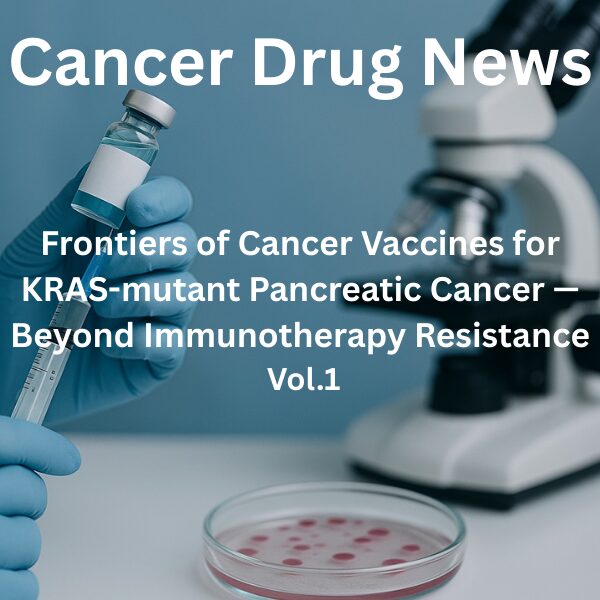Trilogy Subtitles
- Part 1: Biological Background of KRAS-mutant PDAC and Theoretical Basis of Cancer Vaccines
- Part 2: Clinical Advances in RNA Vaccines and the AMPLIFY-201 Trial
- Part 3: CAR-T Integration and Next-generation Vaccine Design
Part 1: Biological Background of KRAS-mutant PDAC and Theoretical Basis of Cancer Vaccines
Characteristics of KRAS mutations in PDAC
Pancreatic ductal adenocarcinoma (PDAC) is among the most treatment-refractory cancers, with approximately 93% of cases harboring mutations in the KRAS gene. The most common codon 12 variants are G12D, G12V, and G12R. These mutations arise at the earliest stages of tumorigenesis and are clonally fixed, qualifying them as indispensable oncogenic drivers.
Large-scale genomic analyses have revealed that KRAS G12D is associated with poor prognosis, increased metabolic dependency, and enhanced immune evasion. By contrast, G12R mutations, though less frequent, tend to correlate with longer survival and exhibit distinct immunological and signaling features. These observations highlight the importance of considering the heterogeneity of KRAS mutations when designing therapeutic approaches.
The significance of vaccine therapy
Immune checkpoint inhibitors (ICIs) have demonstrated limited efficacy in PDAC, with single-agent response rates under 5%. This is attributed to PDAC’s inherently low tumor mutational burden (TMB) and its profoundly immunosuppressive tumor microenvironment. In contrast, KRAS mutations are essential for tumor survival and are consistently and uniformly expressed, making them ideal “public neoantigen” targets for vaccine therapy.
The key advantage of cancer vaccines lies in their potential to stimulate robust tumor-specific T cell responses, generate durable immune memory, and prevent recurrence by eliminating minimal residual disease (MRD) that often evades conventional therapies.
Theoretical foundation
Three main vaccine strategies are under active development:
- Personalized neoantigen vaccines
Tumor sequencing identifies unique patient-specific mutations, which are then formulated into individualized vaccines capable of eliciting strong T cell responses. - mKRAS vaccines (public neoantigen-based)
Vaccines directed against shared KRAS driver mutations such as G12D or G12R are broadly applicable across diverse HLA backgrounds, enabling “off-the-shelf” immunization. - CAR-T and vaccine synergy
CAR-T cell therapy alone often fails in solid tumors due to antigen heterogeneity. However, vaccine boosting of CAR-T cells can trigger IFN-γ-driven antigen spreading, expanding immune recognition to non-targeted tumor antigens. This approach offers a new paradigm for tackling resistant solid tumors.
Future perspectives and challenges
- Variant-specific optimization: Tailoring strategies to differences in immunogenicity between KRAS variants (e.g., G12D vs. G12R).
- Combination therapies: Determining safe and effective sequences for integrating ICIs, CAR-T, and vaccines.
- Balancing universality and personalization: Integrating public neoantigen vaccines with personalized mRNA vaccines.
- Practical considerations: Overcoming challenges of manufacturing scalability, cost reduction, and clinical validation.
Summary
KRAS-mutant PDAC has long been categorized as “immunotherapy-resistant.” Yet, the emergence of neoantigen and KRAS-targeted vaccines opens new opportunities for recurrence prevention and survival extension. Vaccines targeting KRAS may herald a paradigm shift in pancreatic cancer treatment.
References (Common for the 4-part KRAS Cancer Vaccine Series)
- Nature, 2023. RNA neoantigen vaccines prime long-lived CD8+ T cells in pancreatic cancer.
- Nature, 2023. Personalized RNA neoantigen vaccines stimulate T cells in pancreatic cancer.
- Nature Medicine, 2023. Lymph-node-targeted, mKRAS-specific amphiphile vaccine in pancreatic and colorectal cancer: the phase 1 AMPLIFY-201 trial.
- Nature Medicine, 2025. Lymph node-targeted, mKRAS-specific amphiphile vaccine in pancreatic and colorectal cancer: final results of the phase 1 AMPLIFY-201 trial.
- Nature, 2023. Vaccine-boosted CAR T crosstalk with host immunity to reject tumors with antigen heterogeneity.
- Cancer Cell, 2020. Distinct clinical outcomes and biological features of specific KRAS mutants in human pancreatic cancer.
- Clinical Cancer Research, 2021. Distinct Molecular and Clinical Features of Specific Variants of KRAS Codon 12 in Pancreatic Adenocarcinoma.
- Nature, 2023. A neoantigen vaccine generates antitumour immunity in renal cell carcinoma.
- Lancet Oncology, 2023. Personalized neoantigen vaccine and pembrolizumab in advanced hepatocellular carcinoma: a phase 1/2 trial.
This article was edited by the Morningglorysciences team.









Comments